|
Posted on 10-4-2003
Wailing
Children, the Wounded, the Dead
By Robert Fisk, Independent UK, Thursday 03 April 2003
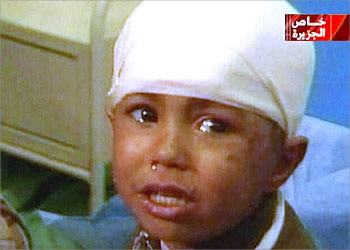 Victims of the Day Cluster Bombs Rained on Babylon The wounds
are vicious and deep, a rash of scarlet spots on the back and
thighs or face, the shards of shrapnel from the cluster bombs
buried an inch or more in the flesh. The wards of the Hillah
teaching hospital are proof that something illegal - something
quite outside the Geneva Conventions - occurred in the villages
around the city once known as Babylon.
Victims of the Day Cluster Bombs Rained on Babylon The wounds
are vicious and deep, a rash of scarlet spots on the back and
thighs or face, the shards of shrapnel from the cluster bombs
buried an inch or more in the flesh. The wards of the Hillah
teaching hospital are proof that something illegal - something
quite outside the Geneva Conventions - occurred in the villages
around the city once known as Babylon.
The wailing children, the young women with breast and leg wounds,
the 10 patients upon whom doctors had to perform brain surgery
to remove metal from their heads, talk of the days and nights
when the explosives fell "like grapes" from the sky.
Cluster bombs, the doctors say - and the detritus of the air
raids around the hamlets of Nadr and Djifil and Akramin and
Mahawil and Mohandesin and Hail Askeri shows that they are right.
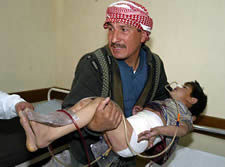
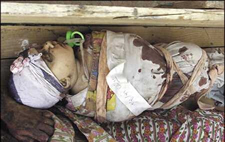
Were they American or British aircraft that showered these
villages with one of the most lethal weapons of modern warfare?
The 61 dead who have passed through the Hillah hospital since
Saturday night cannot tell us. Nor can the survivors who, in
many cases, were sitting in their homes when the white canisters
opened high above their village, spilling thousands of bomblets
into the sky, exploding in the air, soaring through windows
and doorways to burst indoors or bouncing off the roofs of the
concrete huts to blow up later in the roadways.
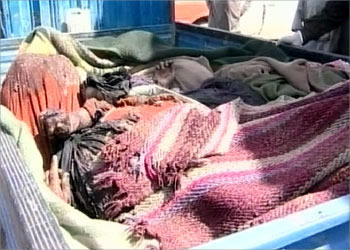 Rahed Hakem remembers that it was 10.30am on Sunday when she
was sitting in her home in Nadr, that she heard "the voice
of explosions" and looked out of the door to see "the
sky raining fire". She said the bomblets were a black-grey
colour. Mohamed Moussa described the clusters of "little
boxes" that fell out of the sky in the same village and
thought they were silver-coloured. They fell like "small
grapefruit," he said. "If it hadn't exploded and you
touched it, it went off immediately," he said. "They
exploded in the air and on the ground and we still have some
in our home, unexploded."
Rahed Hakem remembers that it was 10.30am on Sunday when she
was sitting in her home in Nadr, that she heard "the voice
of explosions" and looked out of the door to see "the
sky raining fire". She said the bomblets were a black-grey
colour. Mohamed Moussa described the clusters of "little
boxes" that fell out of the sky in the same village and
thought they were silver-coloured. They fell like "small
grapefruit," he said. "If it hadn't exploded and you
touched it, it went off immediately," he said. "They
exploded in the air and on the ground and we still have some
in our home, unexploded."
Karima Mizler thought the bomblets had some kind of wires attached
to them - perhaps the metal "butterfly" that contains
sets of the tiny cluster bombs and springs open to release them
in showers.
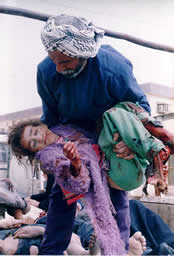 Some
victims died at once, mostly women and children, some of whose
blackened, decomposing remains lay in the tiny charnel house
mortuary at the back of the Hillah hospital. The teaching college
received more than 200 wounded since Saturday night - the 61
dead are only those who were brought to the hospital or who
died during or after surgery, and many others are believed to
have been buried in their home villages - and, of these, doctors
say about 80 per cent were civilians. Some
victims died at once, mostly women and children, some of whose
blackened, decomposing remains lay in the tiny charnel house
mortuary at the back of the Hillah hospital. The teaching college
received more than 200 wounded since Saturday night - the 61
dead are only those who were brought to the hospital or who
died during or after surgery, and many others are believed to
have been buried in their home villages - and, of these, doctors
say about 80 per cent were civilians.
Soldiers there certainly were, at least 40 if these statistics
are to be believed, and amid the foul clothing of the dead outside
the mortuary door I found a khaki military belt and a combat
jacket. But village men can also be soldiers and both they and
their wives and daughters insisted there were no military installations
around their homes. True or false? Who is to know if a tank
or a missile launcher was positioned in a nearby field - as
they were along the highway north to Baghdad? But the Geneva
Conventions demand protection for civilians even if they are
intermingled with military personnel, and the use of cluster
bombs in these villages - even if aimed at military targets
- thus crosses the boundaries of international law.
So it was that 27-year old Asil Yamin came to receive those
awful round wounds in her back. And so five-year-old Zaman Abbais
was hit in the legs and 48-year-old Samira Abdul-Hamza in the
eyes, chest and legs. Her son Haidar, a 32-year-old soldier,
said the containers which fell to the ground were white with
some red and green sometimes painted on them. ''It is like a
grenade and they came into the houses," he said. "Some
stayed on the land, others exploded."
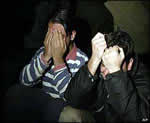 Heartbreaking
is the only word to describe 10-year-old Maryam Nasr and her
five-year-old sister Hoda. Maryam has a patch over her right
eye where a piece of bomblet embedded itself. She also had wounds
to the stomach and thighs. I didn't realise that Hoda, standing
by her sister's bed, was wounded until her mother carefully
lifted the little girl's scarf and long hair to show a deep
puncture in the right side of her head, just above her ear,
congealed blood sticking to her hair but the wound still gently
bleeding. Their mother described how she had been inside her
home and heard an explosion and found her daughters lying in
their own blood near the door. The little girls alternately
smiled and hid when I took their pictures. In other wards, the
hideously wounded would try to laugh, to show their bravery.
It was a humbling experience. Heartbreaking
is the only word to describe 10-year-old Maryam Nasr and her
five-year-old sister Hoda. Maryam has a patch over her right
eye where a piece of bomblet embedded itself. She also had wounds
to the stomach and thighs. I didn't realise that Hoda, standing
by her sister's bed, was wounded until her mother carefully
lifted the little girl's scarf and long hair to show a deep
puncture in the right side of her head, just above her ear,
congealed blood sticking to her hair but the wound still gently
bleeding. Their mother described how she had been inside her
home and heard an explosion and found her daughters lying in
their own blood near the door. The little girls alternately
smiled and hid when I took their pictures. In other wards, the
hideously wounded would try to laugh, to show their bravery.
It was a humbling experience.
The Iraqi authorities, of course, were all too ready to allow
us journalists access to these patients. But there was no way
these children and often uneducated parents could manufacture
their stories of tragedy and pain. Nor could the Iraqis have
faked the scene in Nadr village where the remains of the tiny
bomblets littered the ground beside the scorch marks. A crew
from Sky Television even managed to bring a set of bomblet shrapnel
back to Baghdad from Nadr with them, the wicked little metal
balls that are intended to puncture the human body still locked
into their frame like cough sweets in a metal sheath, They were
of a black colour which glinted silver when held against the
light.
Again, were the aircraft that dropped these terrible weapons
American or British? The deputy administrator of the hospital
and one of his doctors told a confused tale of military action
around the city in recent days, of Apache helicopters that would
disgorge special forces on the road to Karbala; one of their
operations - if the hospital personnel are to be believed -
went spectacularly wrong one night recently when militiamen
forced them to retreat. Shortly afterwards, the cluster bomb
raids began, although the villages that were targeted appear
to have been on the other side of Hillah to the reported abortive
American attack.
One thing was clear: there is no "front line" in
the fighting around Babylon, that US forces strike into land
around the Tigris river by air and then withdraw and Iraqi forces
do much the same in the other direction. Only the Americans
and British, of course, have air superiority - indeed there
is no evidence a single Iraqi aircraft has taken off since the
start of the invasion - so even the US and British officers
back at Qatar headquarters can hardly claim the cluster bombs
were dropped by Iraq.
The most recent raid occurred on Tuesday when 11 civilians
were killed - two of them women and three of them children -
in a village called Hindiyeh. A man sent to collect the corpses
reported to the hospital the only living thing he found in the
area was a hen. Iraqi bomb disposal officers were ordered into
the villages yesterday afternoon to clear the unexploded ordnance.
Needless to say, it is not the first time cluster bombs have
been used against civilians. During Israel's 1982 siege of west
Beirut, its air force dropped cluster bomblets manufactured
for the US Navy across several areas, especially in the Fakhani
and Ouzai districts, causing civilians ferocious and deep wounds
identical to those I saw in Hillah yesterday. Angry at the misuse
of their weapons, which are designed for use against exclusively
military targets, the Reagan administration withheld a shipment
of fighter-bombers for Israel - then relented a few weeks later
and sent the aircraft anyway.
It is not easy to listen to Iraqi officials condemning the
use of illegal weapons when the Iraqi air force has itself dropped
poison gas on the Iranian army and on pro-Iranian Kurdish villages
during the 1980-88 war against Iran. Outraged claims from Iraqi
officials at the abuse of human rights sound like a bell with
a very hollow ring. But something terrible happened around Hillah
this week, something unforgivable and something contrary to
international law. One hesitates, as I say, to talk of human
rights in this land of torture but if the Americans and British
don't watch out, they are likely to find themselves condemned
for what they have always - and rightly - accused Iraq of: war
crimes.

|